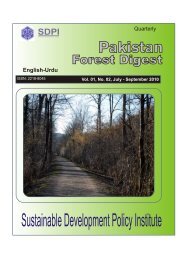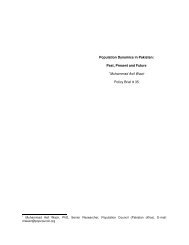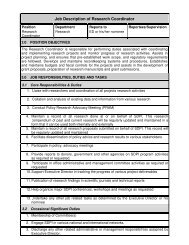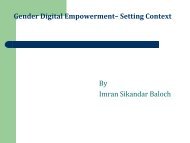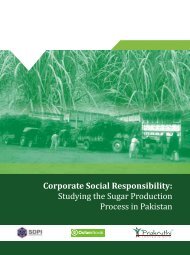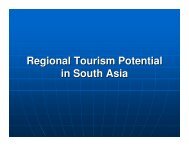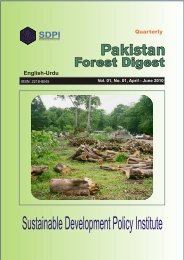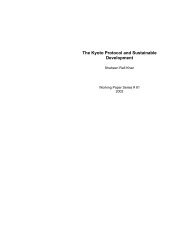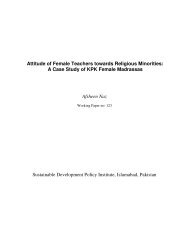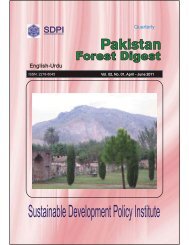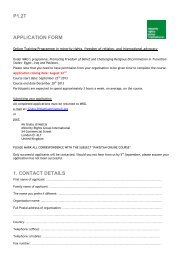<strong>Annual</strong> <strong>Report</strong><strong>2009</strong> - 20<strong>10</strong>Ministry of Special Initiative (MoSI), district government and NGOs, Dissemination of the needfor HWTS such as SODIS through public theatre and poster competitions among children fromschools, colleges and universities. Acknowledging women's role in securing water and food forthe household, a rally will be organized to demonstrate the need of streamlining HWTS such asSODIS through an action plan.A formal launch of the project was held at the federal level with relevant stakeholders. Followingthe successful launch of the initiative HWTS working group was formulated with the individualsfrom MoE, MoH, Ministry of special Initiative, Media, NGOs, civil society organizations, UNagencies, Academia, Chemists and water experts. The first meeting of the working group helpeddivide it into 3 sub groups with specific responsibilities. These groups included technical groups,advocacy groups and policy groups. The aim of this working group is to develop a plan of actionto assist the Government in the successful implementation of the National Drinking water <strong>Policy</strong>in the larger interest of the masses.For further details contact Ms. Mome Saleem. mome@sdpi.orgSituational Analysis of Drinking Water: Facilities in Pilot Districts of Mansehra andKhanewal in Pakistan.2.2 million deaths are attributed to poor water and sanitation facilities and 60% of total childrendeaths may be attributed to contaminated water. The captioned study was carried out by SDPIfor the Ministry of Special Initiative, Government. of Pakistan through support by ABT Associatesinitiative to assess the gaps and needs of the area and the barriers that existed to improvethe existing structure of the water supply and services. The diagnostic study identified the gapsin consultation with different stakeholders including Civil Society Organizations (CSOs), Non-Government Organizations (NGOs), Community Based Organizations (CBOs) and Local Governments(LGs). In the first phase, Khanewal and Mansehra districts were chosen from Punjaband NWFP province for an assessment exercise respectively. The study aimed to identify thedifferent sources of drinking water, its coverage and chemical analysis of randomly selected watersamples in pilot districts. Findings of this study are serving as a benchmark for its replicationin other parts of the country. Focus group discussions were organized with relevant stakeholders,key informant interviews were conducted and water samples from random sites(including public, private, tubewells, hand pumps & local body's water supply system) werechecked for possible water contamination. It was observed that even the water, which is safe fordrinking at source may get contaminated at point of use. SDPI recommended that HWTS maybe promoted in these districts (and across the country) for ensuring improved supply of drinkingwater.For further details contact Mr. Talimand Khan. talimand@sdpi.org24S u s t a I n a b l e D e v e l o p m e n t P o l I c y I n s t I t u t e
<strong>Annual</strong> <strong>Report</strong><strong>2009</strong> - 20<strong>10</strong>The Energy Crisis: <strong>Sustainable</strong> SolutionsElectricity GovernancePakistan is facing a huge electricity shortage and a sharp rise in electricity prices causing socialunrest in some of its urban & rural areas. This has had a negative effect on industrial productivityand a commensurate decline in economic growth. There have been severe monetary repercussionsowing to electricity shortage in the industrial and export sectors, which according toestimates by the Ministry of Water and Power (MOWP), have experienced losses at Rs 219 billionand Rs 75 billion respectively. Additionally, there has been a drastic decrease in 400,000jobs in <strong>2009</strong>. The state of Pakistan's electricity sector can be attributed mainly to a high dependenceon fossils fuels, high domestic & industrial demand and high transmission losses. Furthermore,in terms of governance, an absence of transparency and incompetence of the managersare problems endemic in the system that regulates provision of electricity in the country. Thesupply demand gap has been widened by 35% due to seasonal availability in hydropower and in<strong>2009</strong>-<strong>10</strong>, the overall electricity consumption declined by 1.7%. The industrial sector has beenparticularly hard hit by the electricity shortage and there has been a substantial reduction in industrialproductivity, which has had daunting impacts on the country's exports and eventuallyleads to the deterioration of balance of payments.Electricity governance in Pakistan has to be consolidated by supporting a more transparentelectricity power regulatory process. Therefore, the roles of the Ministry of Water and Power(MOWP) and Private Power and Infrastructure Board (PPIB) must also be scrutinized. It is intendedstakeholders from different backgrounds can be brought together, so as to develop acommon understanding about exploiting the potential of best practices and highlighting flaws ingovernance pertaining to the electricity sector.In order to strengthen the electricity regulatory processes in Pakistan, SDPI in a joint initiativewith US AID- SARI Energy, undertook the project of Electricity Governance in Pakistan. Thestudy has emerged at a time when power outages together with high electricity costs, have arguablybecome a greater socio-economic menace than terrorism for Pakistan. The project focuseson the National Electric Power Regulation Authority, which is responsible for regulatingpower in Pakistan. The study aims to undertake a comprehensive in-depth analysis and discussrecommendations for interventions to improve Pakistan's electricity sector. The power sectorwas liberalized in the mid 1990s, whereby a number of private entities gained access to the sectorboosting competitiveness. Governance, however, has been exclusive of public interest dueto the sector's entrenched complexity. It is necessary for the public to understand the issues andto become involved in decision-making processes. The study will also help to create a strongcollaboration between civil society, policymakers, regulators and other concerned parties on acommon platform, whereby good governance and sound decision making processes are encouragedat the policy level. The long-term goal of the policy is the continuous provision of electricityto consumers, industry, farmers and customers at cheap rates.The methodology adopted for the study leads to an analysis and a sound assessment of thesituation, which is being reflected in the project report. The preparation of the report entailswidespread consultation with the stakeholders, whereby its structure is being sufficiently delineated,identifying gaps and opportunities to improve governance. The nature of Pakistan's electricitysector is unique so there shall be an adoption of research indicators pertaining to theWorld Resources <strong>Institute</strong> and the National <strong>Institute</strong> of Public Finance and <strong>Policy</strong> India. However,other country specific methodologies are being applied to undertake evaluation of theprocesses of electricity governance in Pakistan. It is believed that the research undertaken canhelp establish a new paradigm for measurable performance indicators for Pakistan's electricity/energy sectors. Finally, a strategy is proposed to harness cheap hydroelectricity and other renewableenergy generation options, which are imperative for a sustainable regional and globalenvironment. Civil society, media and consumers are encouraged to understand and influence25S u s t a I n a b l e D e v e l o p m e n t P o l I c y I n s t I t u t e



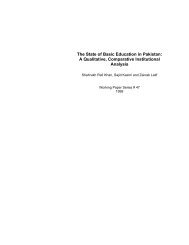
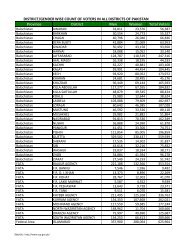
![(October - December, 2010) [13th SDC Special Bulletin]](https://img.yumpu.com/50118608/1/184x260/october-december-2010-13th-sdc-special-bulletin.jpg?quality=85)
